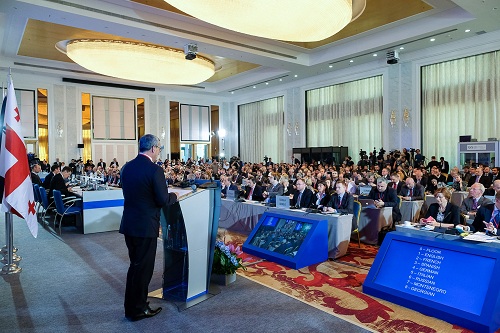
NATO PA President Paolo Alli addresses the session, May 29, 2017. Photo: nato.int
On May 29, the NATO Parliamentary Assembly (PA) passed Declaration 435 on Supporting Georgia’s Euro-Atlantic Integration. The vote on the Declaration took place during the plenary sitting on the last day of the Assembly’s Spring 2017 Session that took place on May 26-29 in Tbilisi, Georgia.
In the Declaration, the Assembly reaffirmed its commitment to NATO’s Open Door Policy “for all European democracies that share the values of our Alliance and are willing and able to assume the responsibilities and obligations of membership,” adding that a decision on the NATO membership “cannot be influenced by a third country.”
The PA also reaffirmed “unwavering support” specifically to Georgia’s Euro-Atlantic integration, recalling “the provisions in the 3 April 2008 Bucharest Summit Declaration that Georgia will become a member of NATO.” The Assembly’s Declaration said that “Georgia’s relationship with the Alliance contains all the practical tools to prepare for eventual membership,” but noted that it would happen “with Membership Action Plan [MAP] as an integral part of the process.”
The NATO PA expressed appreciation of “Georgia’s continuous and significant contribution to the common Euro-Atlantic security,” including through its “sizable” participation in the NATO Resolute Support Mission in Afghanistan, and NATO Response Force, as well as of “the high level of continuous support for the Euro-Atlantic integration among the people and main political parties in Georgia.” It also emphasized “the strategic importance of the Black Sea region for common Euro-Atlantic security.”
The document welcomed NATO-Georgia cooperation, including through the NATO-Georgia Commission, the Annual National Programme and the Substantial NATO-Georgia Package, and recognized “the impressive progress made in implementing this Package.”
The PA commended Georgia for “the consistent and significant progress” made in “consolidating its democracy, improving transparency of its institutions and fostering economic development,” but noted that “further efforts are needed to bolster the rule of law and the system of checks and balances, ensure media pluralism and reduce political polarization.”
The Declaration also reaffirmed the NATO PA’s “strong support to the sovereignty and territorial integrity of Georgia in its internationally recognized borders,” and condemned “the continuous illegal occupation of the Abkhazia and South Ossetia regions of Georgia,” along with “grave large-scale violations of human rights in the occupied regions.” It called upon the Russian Federation to withdraw its military forces from the occupied territories, reciprocate Georgia’s unilateral pledge not to use force, and “refrain from any provocative and aggressive steps towards Georgia.”
It also condemned “the continued violation of a six-point ceasefire agreement by the Russian Federation and steps taken towards the de facto annexation of these regions by Russia as well as extensive military build-up in these territories,” saying these actions by Russia posed a serious threat to broader regional peace and security.
The PA welcomed “Georgia’s constructive policy aimed at de-escalation of tensions with Russia,” including its “constructive participation” in the Geneva International Discussions.
The Assembly urged the NATO member states to continue rendering strong support to Georgia’s NATO integration, help create the conditions to grant the MAP to Georgia in the future, and support Georgia in tackling hybrid threats, “including propaganda and disinformation campaigns aimed at eroding public support for the pro-Western strategic course.”
More than 200 lawmakers from parliaments of NATO Allies and 21 partner countries attended the meeting. The four-day meeting in Tbilisi marked only the fifth time in its six-decade history that the NATO PA has held a session outside the trans-Atlantic Alliance.
The NATO PA Session discussed a range of issues, including the necessity to counter Russia’s policies in the region, defense burden sharing, the Alliance’s role in Afghanistan; security implications of climate change; geopolitical changes in the Arctic; the impact of social media; terrorism; and the wars in Syria and Iraq.
The Assembly will meet next to hold its annual autumn session October 6-9 in Bucharest, Romania.
This post is also available in: ქართული (Georgian)
